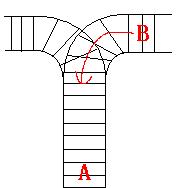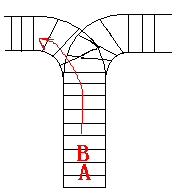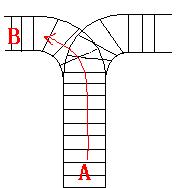Train Problem I
Time Limit: 2000/1000 MS (Java/Others) Memory Limit: 65536/32768 K (Java/Others)
Total Submission(s): 6948 Accepted Submission(s): 2547
Problem Description
As
the new term comes, the Ignatius Train Station is very busy nowadays. A
lot of student want to get back to school by train(because the trains
in the Ignatius Train Station is the fastest all over the world ^v^).
But here comes a problem, there is only one railway where all the trains
stop. So all the trains come in from one side and get out from the
other side. For this problem, if train A gets into the railway first,
and then train B gets into the railway before train A leaves, train A
can't leave until train B leaves. The pictures below figure out the
problem. Now the problem for you is, there are at most 9 trains in the
station, all the trains has an ID(numbered from 1 to n), the trains get
into the railway in an order O1, your task is to determine whether the
trains can get out in an order O2.



the new term comes, the Ignatius Train Station is very busy nowadays. A
lot of student want to get back to school by train(because the trains
in the Ignatius Train Station is the fastest all over the world ^v^).
But here comes a problem, there is only one railway where all the trains
stop. So all the trains come in from one side and get out from the
other side. For this problem, if train A gets into the railway first,
and then train B gets into the railway before train A leaves, train A
can't leave until train B leaves. The pictures below figure out the
problem. Now the problem for you is, there are at most 9 trains in the
station, all the trains has an ID(numbered from 1 to n), the trains get
into the railway in an order O1, your task is to determine whether the
trains can get out in an order O2.



Input
The
input contains several test cases. Each test case consists of an
integer, the number of trains, and two strings, the order of the trains
come in:O1, and the order of the trains leave:O2. The input is
terminated by the end of file. More details in the Sample Input.
input contains several test cases. Each test case consists of an
integer, the number of trains, and two strings, the order of the trains
come in:O1, and the order of the trains leave:O2. The input is
terminated by the end of file. More details in the Sample Input.
Output
The
output contains a string "No." if you can't exchange O2 to O1, or you
should output a line contains "Yes.", and then output your way in
exchanging the order(you should output "in" for a train getting into the
railway, and "out" for a train getting out of the railway). Print a
line contains "FINISH" after each test case. More details in the Sample
Output.
output contains a string "No." if you can't exchange O2 to O1, or you
should output a line contains "Yes.", and then output your way in
exchanging the order(you should output "in" for a train getting into the
railway, and "out" for a train getting out of the railway). Print a
line contains "FINISH" after each test case. More details in the Sample
Output.
Sample Input
3 123 321
3 123 312
3 123 312
Sample Output
Yes.
in
in
in
out
out
out
FINISH
No.
FINISH
in
in
in
out
out
out
FINISH
No.
FINISH
//用数组模拟栈
#include <stdio.h>
#include <string.h>
#include <stdlib.h>
char str1[20], str2[20];
int stack[20],top;
int visit[20];
int N;
void solve( )
{
int i, j, len, k = 0, l;
for ( i = 0, j = 0; i < N; i++) {
if (str1[i] != str2[j] ) {
stack[top++] = str1[i] - '0';
visit[k++] = 1;
}
else {
stack[top++] = str1[i] - '0';
visit[k++] = 1;
for( l = top - 1; l >= 0; l--) {
if ( stack[l] == str2[j]- '0') {
top--;
visit[k++] = 0;
j++;
}
else
break;
}
}
}
//printf("%d %d\n", top, j);
if (j == N)
puts("Yes.");
else {
puts("No.");
puts("FINISH");
return;
}
for (i = 0; i < k; i++)
if ( visit[i])
puts("in");
else
puts("out");
puts("FINISH");
}
int main( )
{
while (scanf("%d", &N) != EOF) {
scanf("%s%s",str1,str2);
top = 0;
memset(stack, 0, sizeof(stack));
memset(visit, 0, sizeof(visit));
solve( );
}
return 0;
}
Hint
Hint
For the first Sample Input, we let train 1 get in, then train 2 and train 3.
So now train 3 is at the top of the railway, so train 3 can leave first, then train 2 and train 1.
In the second Sample input, we should let train 3 leave first, so we have to let train 1 get in, then train 2 and train 3.
Now we can let train 3 leave.
But after that we can't let train 1 leave before train 2, because train 2 is at the top of the railway at the moment.
So we output "No.".